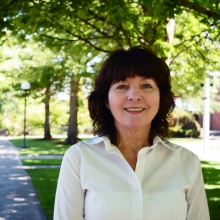Participation in Professional Association Crucial to Career Success
Posted on October 21, 2015
0 comments 1433 Views
By Carol Dennis

The first opportunity Patti Blasco had to attend a Division for Early Childhood (DEC) International Conference was as a graduate student at the University of Virginia in 1988. She had heard about this professional association through her professors, who were very involved with the Council for Exceptional Children (CEC), the parent organization of the DEC.
Because Patti’s interest is in early childhood, it made perfect sense that she would be attracted to the work of these groups. So, while still a graduate student, she joined the CEC and the DEC.
Twenty-seven years later, Patricia Blasco, Ph.D. served as
Chair of the 2015 DEC International Conference on Young Children with Special Needs and Their Families.
The path that brought her to this position speaks volumes about the importance of professional associations to a successful and fulfilling career.
Her first DEC Conference
At that first DEC Conference, she had the opportunity to meet many of her heroes in the field of special education who were more than willing to interact with her and excited to talk with her about their research. She was so inspired by the experience that she went to the DEC business meetings and was soon asked to join the conference planning committee - all while still a graduate student and very early in her career.
Staying connected through state DEC subdivisions
In those early years, her husband’s position required them to move across the country several times. With every move, Dr. Blasco joined that state’s DEC subdivision. She was able to network with colleagues and to be actively engaged in her profession. Soon after, she was appointed to be the chair of DEC subdivisions (a position that no longer exists), which gave her the opportunity to be involved as a national leader, working with subdivisions all around the country and international groups. Many of those relationships are deep and productive to this day.
Ten years from that first conference, Dr. Blasco became a DEC member-at-large and served on the DEC Executive Board (1998 – 2001).
2001 – 2013
When family priorities needed to change, Dr. Blasco became less involved in the conferences and more involved in other aspects of the DEC. She became a conference reviewer (helping to select presentations) and an Associate Editor for the DEC’s Young, Exceptional Children. She also remained on the editorial board of DEC’s Journal of Early Intervention since her post-doctoral days at the University of North Carolina.
Also during those years, Dr. Blasco served (and continues to serve) as Adjunct Associate Professor, Institute on Development and Disability, Department of Pediatrics, Oregon Health & Science University (OHSU); Adjunct Professor, College of Education, Western Oregon University; and Project Director on three federal grants through the US Department of Education housed at TRI. Her career in Early Childhood/Early Intervention was expanding, often in collaboration with professional colleagues she had met through her involvement with the DEC.
A challenge to get more involved
In 2013, at the DEC International Conference held in San Francisco, a former DEC Executive Director challenged the attendees with the question, “Are you volunteering for your professional organization?”
Having adult children who were establishing their own lives, Dr. Blasco thought, “I’m free – I’m ready again.” After 12 years of what she calls “taking a backseat,” she put herself forward for several tasks and was asked if she would Chair the 2015 DEC International Conference.
Her first reaction was “not sure” because of the amount of work. But once she got the support of TRI, “which was offered immediately,” having a co-chair who was an outstanding new young leader in the field, and abundant support from the DEC executive office and conference committees, she realized this was a possibility, and hesitation turned to “yes.”
With the support of the DEC staff and other volunteers, this year’s conference was a great success.
The richness of the journey
In these 27 years, Dr. Blasco has had an impressive career in Early Childhood/Early Intervention that has resulted in cutting-edge research, numerous peer reviewed publications, and presentations at national and international conferences, establishing her position as a significant and respected voice within the field. She attributes much of her success to the networking and collaboration that comes from being part of DEC.
Why DEC
Dr. Blasco describes DEC as, “bringing together professionals and families in partnerships from all cross sectors of the profession - all working together for young children with special needs and their families. That’s why I see it as my professional organization - because the mission and goals fit with my beliefs.”
Dr. Blasco concludes by saying, “I think it’s really important for students in Early Childhood programs to be involved in a professional organization that represents the children and families with whom they work.”
After talking with Dr. Patricia Blasco about her own journey, I can see why!
About the Division for Early Childhood
The Division for Early Childhood was started in 1973 by a group of volunteers who cared deeply about the development of young children with special needs. DEC is one of 17 divisions of the Council for Exceptional Children (CEC), the largest professional organization dedicated to improving the educational success of individuals with disabilities and/or gifts and talents.
The Division for Early Childhood (DEC) promotes policies and advances evidence-based practices that support families and enhance the optimal development of young children (0-8) who have or are at risk for developmental delays and disabilities. DEC is an international membership organization for those who work with or on behalf of young children (0-8) with disabilities and other special needs and their families.
Recent Blog Posts
Project Spotlight: Creating Supports for Survivors of Gender-Based Violence Jun 6, 2018
Project Spotlight: Investigating Executive Function Concerns in Infants and Toddlers May 23, 2018
Project Spotlight: Reaching Out to an Underserved Population May 9, 2018
Project Spotlight: Fighting Against Gender-Based Violence Mar 14, 2018
Project Spotlight: Increasing Diversity in Early Childhood Educators Feb 7, 2018

